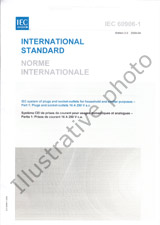We need your consent to use the individual data so that you can see information about your interests, among other things. Click "OK" to give your consent.

IEC/TS 62215-2-ed.1.0
Integrated circuits - Measurement of impulse immunity - Part 2: Synchronous transient injection method
STANDARD published on 10.9.2007
The information about the standard:
Designation standards: IEC/TS 62215-2-ed.1.0
Publication date standards: 10.9.2007
SKU: NS-408115
The number of pages: 27
Approximate weight : 81 g (0.18 lbs)
Country: International technical standard
Category: Technical standards IEC
The category - similar standards:
Annotation of standard text IEC/TS 62215-2-ed.1.0 :
Contains general information and definitions on the test method to evaluate the immunity of integrated circuits (ICs) against fast conducted synchronous transient disturbances.The objective is to describe general conditions to obtain a quantitative measure of immunity of ICs establishing a uniform testing environment. Critical parameters that are expected to influence the test results are described. Deviations from this specification should be explicitly noted in the individual test report. This synchronous transient immunity measurement method uses short impulses with fast rise times of different amplitude, duration and polarity in a conductive mode to the IC. In this method, the applied impulse has to be synchronized with the activity of the IC to make sure that controlled and reproducible conditions can be assured
Similar standards:
23.5.2002
17.5.2002
17.5.2002
3.10.2003
2.8.1991
1.1.1986
We recommend:
Technical standards updating
Do you want to make sure you use only the valid technical standards?
We can offer you a solution which will provide you a monthly overview concerning the updating of standards which you use.
Would you like to know more? Look at this page.



 Cookies
Cookies
